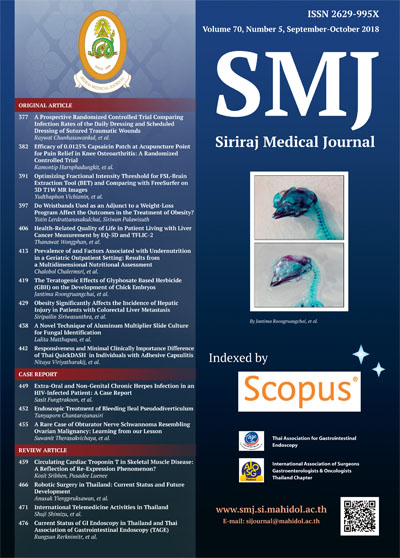Obesity Significantly Affects the Incidence of Hepatic Injury in Patients with Colorectal Liver Metastasis
Keywords:
Obesity; hepatic injury; colorectal liver metastasisAbstract
Objective: Surgical resection is the mainstay treatment for colorectal liver metastasis. In unresectable cases,
chemotherapy is used to transform the tumor into resectable lesions, with related concerns about toxicity to nontumoral
liver parenchyma. Liver toxicity, including steatosis, steatohepatitis, and sinusoidal dilation, has been
reported. However, these changes are difficult to histologically distinguish from non-alcoholic fatty liver disease,
which is commonly found in populations and attributed mainly to metabolic syndrome. The aim of this study was
to investigate the factors associated with liver injury in patients with colorectal liver metastasis.
Methods: This retrospective study included the patients who underwent hepatic resection for colorectal liver metastasis
at Siriraj Hospital during the eight-year period (2006 to 2013). Patient demographic data, clinical characteristics,
and histologic changes related to liver injury were collected and analyzed. Ten factors were evaluated for association
with liver injury in selected patients.
Results: Ninety-two patients (50 men, 42 women) were included, with a mean age of 59.4 years (range: 48.5-70.3).
Forty-four patients (47.8%) received preoperative chemotherapy (CMT). Incidence of liver injury was not significantly
different between the CMT and non-CMT groups (65.9% vs. 62.5%; p=0.902). However, incidence of liver injury
was significantly higher in obese patients than in non-obese patients (82.8% vs. 55.6%; p=0.022, odds ratio=3.95).
Multivariate analysis showed that obesity (BMI >25 kg/m2) was the only factor significantly associated with liver
injury in patients with colorectal liver metastasis.
Conclusion: Of the ten factors evaluated, obesity was the only factor found to be significantly associated with liver
injury in patients with colorectal liver metastasis.
Downloads
Published
How to Cite
Issue
Section
License
Authors who publish with this journal agree to the following conditions:
Copyright Transfer
In submitting a manuscript, the authors acknowledge that the work will become the copyrighted property of Siriraj Medical Journal upon publication.
License
Articles are licensed under a Creative Commons Attribution-NonCommercial-NoDerivatives 4.0 International License (CC BY-NC-ND 4.0). This license allows for the sharing of the work for non-commercial purposes with proper attribution to the authors and the journal. However, it does not permit modifications or the creation of derivative works.
Sharing and Access
Authors are encouraged to share their article on their personal or institutional websites and through other non-commercial platforms. Doing so can increase readership and citations.











